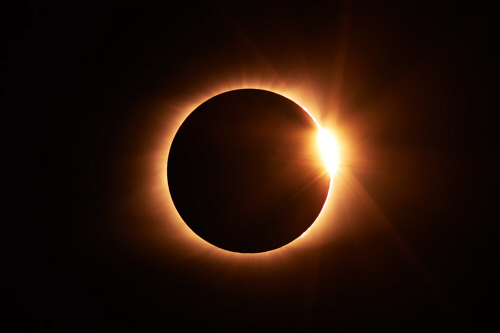Solar Eclipse Was a Buzzkill for Bees
当日食降临,蜜蜂不再嗡个不停!
Bees suddenly fell silent when the sun disappeared during last year’s solar eclipse – perhaps because they were tricked into night mode. Christopher Intagliata reports.
在去年的日食期间,当太阳消失不见时,蜜蜂突然变得“悄无声息”,这可能是因为它们误以为是夜晚,而进入了夜间模式。——克里斯托弗·因塔利亚塔报道。
Last summer’s total solar eclipse sliced right through Columbia, Missouri. “It was remarkable. As a biologist I generally reserve that word ‘remarkable’ for biological phenomena.”
去年夏天发生的日全食刚好覆盖密苏里州的哥伦比亚市。“这实在令人叹为观止,作为一名生物学家,通常我会很谨慎的使用‘叹为观止’这个词去形容一个生物学现象。”她说。

Candace Galen is based at the University of Missouri, in Columbia. And, being a biologist, she thought, why not use this astronomical phenomenon to study a biological one? Specifically: as the skies darkened, would daytime pollinators, like bumblebees and honeybees, call it quits?
坎迪斯·盖伦在哥伦比亚的密苏里大学工作。而作为一名生物学家,她想,为什么不利用这种天文现象来研究一种生物学现象呢?具体而言就是:随着天空变暗,白天传粉者,如大黄蜂和蜜蜂,会停止工作吗?
“What better activity during an eclipse than to go out with a recorder and record the bees?”
“日食期间,还有什么比出去用录音机记录蜜蜂的声音更有趣呢?”
So Galen asked 400 citizen scientists – including young students – to place audio recorders in 16 flower patches along the path of totality, in Oregon, Idaho and Missouri. When they analyzed the audio, they found that during partial eclipse, bee buzzing continued. But when totality hit, the bees went silent… and only the conversational buzz of human observers could be heard. Then, as the moon passed and the sun again lit up the sky, the bees regained their buzz.
因此,盖伦要求400名公民科学家——包括年轻学生——在俄勒冈州、爱达荷州和密苏里州路边所有的16片花丛中放置录音机。当他们分析音频时,他们发现在日偏食期间,蜜蜂嗡嗡声继续发出。但是当日全食时,蜜蜂就没有发出嗡嗡声了……只能听到人类观察者的交谈声。随后,当月亮绕过太阳,太阳重现天空,蜜蜂又再次发出嗡嗡声。
The full write-up is in the Annals of the Entomological Society of America. Candace Galen et al., Pollination on the Dark Side: Acoustic Monitoring Reveals Impacts of a Total Solar Eclipse on Flight Behavior and Activity Schedule of Foraging Bees.
该研究完整文章发表在美国昆虫学会的年报上。坎迪斯·盖伦等人著:《黑暗中的授粉:声监控揭示了日全食对职蜂飞行行为和日常活动的影响》
Galen and her colleagues did notice one strange detail: the individual buzzes lasted longer than normal during the partial eclipse periods. Perhaps, Galen says, because the bees were flying more slowly to navigate darker conditions. Or maybe they were returning to their nests, thinking the day was through. It’s hard to tell from the recording, she says. Which is why, come the next American total solar eclipse in 2024, she’ll be back out listening once again.
盖伦和她的同事特别注意到一个奇怪的细节:在日偏食期间,单个蜜蜂嗡嗡声的持续时间比平时长。盖伦说,也许因为蜜蜂放慢了飞行速度,以便在更黑暗的环境中辨别方向。 或者,因为它们认为这一天的工作已经结束,便返回它们的巢穴去了。盖伦表示,从录音中很难分析出到底是哪种原因。所以在2024年将发生的下一次美国日全食中,她将再次记录蜜蜂的嗡嗡声,并作分析。
“I’m a scientist, my curiosity is never satisfied, right?”
“我是一名科学家,我的好奇心可是永不满足的,你说呢?”
英文、中文版本下载:http://www.yingyushijie.com/shop/source/detail/id/947.html








